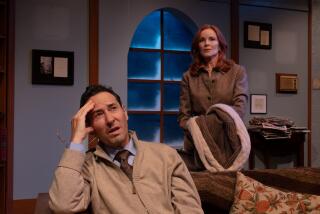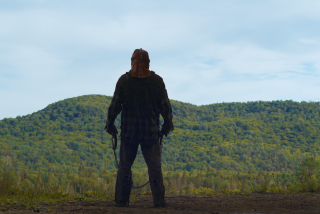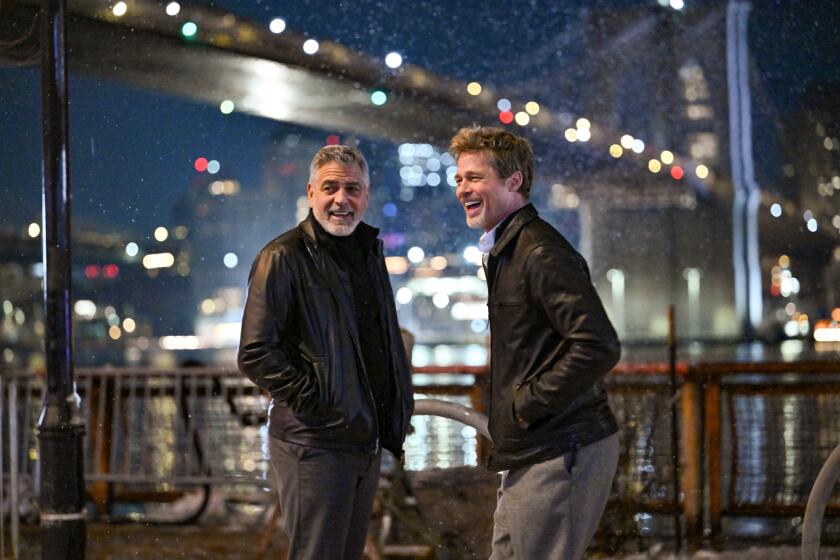Review: In the unsettling ‘Midsommar,’ the nightmare unfolds in broad daylight
The setting of “Midsommar,” a luxuriant deep-tissue freakout from writer-director Ari Aster, is a picturesque commune in Hälsingland, Sweden, that is holding a nine-day celebration in observation of the summer solstice. Along for the trip is a young American, Dani (Florence Pugh), who has recently endured an unspeakable tragedy and seems doomed to endure another if the rules of genre and the playful, punishing sensibility of her creator are any indication.
It is no spoiler to note that the festivities begin in beauty and end in horror — and indeed, the picture’s most ingenious and intuitive stroke is to blur the boundaries between the two. Unlike Aster’s terrifying 2018 debut feature, “Hereditary,” a haunted-house tale bathed in nighttime shadows, “Midsommar” is a nightmare that unfolds in broad daylight. The spell that it casts is bright, dreamy and absorbing, but it is also in no particular hurry to come into focus, which makes its aftereffects all the harder to shake.
Aster’s admirers will recognize his shivery command of pace and tone here, as well as a few signature formal gestures: elegantly jarring transitions, eerie dream sequences, a camera that remains alert even when it stands at a remove from the action. “Midsommar” is as deliberate and drawn-out a picture as “Hereditary,” if also, ultimately, a less overtly frightening one. That may sound like a letdown, but it is also a sign of Aster’s growing confidence, his willingness to push his austere, slow-burning showmanship beyond the traditional grammar of cinematic horror.
RELATED: Disturbed and confused by ‘Midsommar’? Let the filmmakers explain »
What truly binds “Midsommar” to “Hereditary,” beyond their spasms of dark comedy and their fascination with intricate pagan subcultures, is a commitment to the subject of human grief. In each story the emotional and psychological contours of trauma, loss and abandonment are explored so ruthlessly that basic, bloodcurdling shocks seem almost a relief by comparison.
The story begins with Dani in a panic at home, as a personal emergency swiftly spirals toward its worst possible outcome. She seeks solace in the aftermath from her boyfriend, Christian (Jack Reynor), and is perhaps too shaken to realize that he was on the verge of ending their four-year relationship. That he feels obliged to stay with her, at least for now, is the only shred of decency Aster is willing to grant Christian, whose handsome face and reserved demeanor conceal a selfishness that can easily be mistaken for sensitivity. (His name, too, turns out to be no coincidence.)
Christian looks like optimal boyfriend material next to his unsympathetic grad-school buddies Josh (William Jackson Harper), who’s focused on writing his dissertation on ancient folklore, and Mark (Will Poulter), who seems to be pursuing a degree in advanced douchebaggery. The three of them have made plans to travel with a Swedish-born friend, Pelle (Vilhelm Blomgren), to his ancestral village for a midsummer festival that occurs once every 90 years — a trippy European jaunt and an academic retreat rolled into one. Christian, feeling a sense of guilt and obligation to Dani, invites her along, to Mark and Josh’s barely concealed irritation.
If you think you can guess what’s coming next — various logistical nightmares, tetchy “bros before hos” arguments that erupt into screaming matches — you are in for the first of a few carefully doled-out surprises. In Pugh’s quietly astonishing performance, the sheer intensity of Dani’s grief, even when hidden behind a reassuring “I’m fine” smile, is palpable enough to keep the others on relatively good behavior. And the tense group dynamics are suspended, at least at first, by the weird splendor of the gathering that awaits them — a spectacle that cinematographer Pawel Pogorzelski captures in a succession of breathtakingly composed and choreographed images.
The midnight sun bears down on a green landscape dotted with man-made structures — a pyramid-like yellow house, a Norse fertility symbol — that are at once charming and faintly sinister. Their hosts, known as the Hårga, wear flowers and white robes embroidered with mysterious symbols, and they go about their tasks with a ritualistic devotion that feels more serene than severe. All-natural hallucinogens are consumed, long silences are observed and only after a while is there any shedding of blood, in a moment whose terror is held in check — and also strangely intensified — by an unmistakable sense of awe.
The Hårga welcome their American visitors with more politeness than warmth, allowing them to join in their celebrations but offering little warning about what each new day will bring. Their customs and artifacts are of great scholarly interest to Josh and Christian, and Aster and his production designer, Henrik Svensson, approach this fictional cult with their own anthropological obsessiveness. The visual scheme isn’t big on explanations — what’s with the bear in the cage? — but as you study the exquisite runes and paintings, the lavish feasts and maypole dances, some of them set to Bobby Krlic’s ecstatically dissonant score, you feel swept up into a world that exists outside time.
The sunlight, disorienting and ever-present, could be a metaphor for Dani’s grief, which would be unyielding even if Christian were genuinely interested in consoling her. But in a more literal and provocative sense it suggests a kind of illumination, a new way of seeing.
Dani is a creature of the modern world who suddenly finds herself lost in a pagan, pre-technological one, an unsettling change of scenery that is also, in some ways, an improvement. Life here is predicated on selflessness, and individual woes seem happily nonexistent. Sex and death, sources of so much pain and anxiety elsewhere, are here tamed into collective submission.
This stands in stark contrast to Mark’s testosterone-fueled idiocy and a peevish academic rivalry that develops between Christian and Josh, all of which amount to a withering assessment of contemporary American masculinity. These are in some ways the least interesting aspects of “Midsommar,” partly because they feel like plot triggers from a more conventional horror movie. (One point that bears closer scrutiny: Josh is pointedly one of three people of color in the story, and his willful immersion in this land of white robes and faces at times brings to mind a rural Scandinavian version of “Get Out.”) Think of these beats as easily digestible bread crumbs on the narrative trail, forging a path into the darker, more difficult heart of the material.
Aster has said that he wrote “Midsommar” years ago following a very bad breakup — an impishly sincere admission that reminded me of the Danish auteur Lars von Trier, who has credited some of his wilder movies to his own epic bouts of depression. There is a whiff of Von Trier’s “Antichrist” to this movie’s gender politics, and there are also strong echoes of Alex Garland’s “Annihilation,” Ben Wheatley’s “Kill List” and especially Robin Hardy’s 1973 pagan-cult classic, “The Wicker Man.” The weight of all this self-conscious auteurism undoubtedly hangs over “Midsommar,” but crucially, it doesn’t leach the movie of its feverish intensity or its strange, searching emotional power.
Amid scenes of revelry, ritual sacrifice and very bizarre sex, what you remember most is the extraordinary commingling of terror and exultation in Dani’s eyes as she beholds the fate that awaits her and her companions. Aster’s control is startling: With diabolical suggestiveness he keeps widening the chasm between Dani and Christian, placing visual and emotional space between two people whose souls have long since drifted apart.
These spaces stretch toward eternity in “Midsommar,” and they speak powerfully to how distant we all are, how little we truly know about each other’s intimate experience — and how, in the end, the not knowing may be for the best.
------------
‘Midsommar’
Rated: R, for disturbing ritualistic violence and grisly images, strong sexual content, graphic nudity, drug use and language
Running time: 2 hours, 26 minutes
Playing: Opens July 3 in general release
[email protected] | Twitter: @JustinCChang
More to Read
Only good movies
Get the Indie Focus newsletter, Mark Olsen's weekly guide to the world of cinema.
You may occasionally receive promotional content from the Los Angeles Times.











